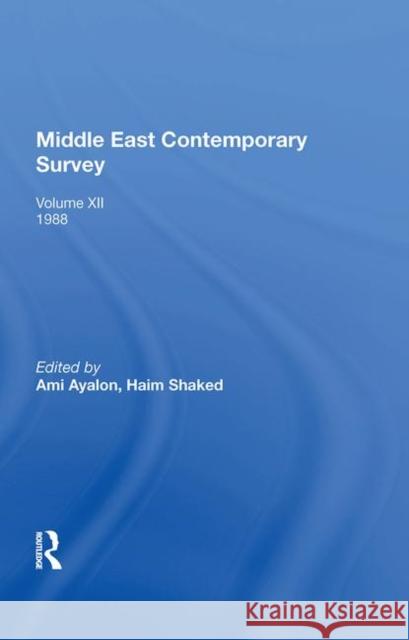Middle East Contemporary Survey, Volume XII, 1988: Volume XII: 1988 » książka
Middle East Contemporary Survey, Volume XII, 1988: Volume XII: 1988
ISBN-13: 9780367003784 / Angielski / Twarda / 2019 / 848 str.
Middle East Contemporary Survey, Volume XII, 1988: Volume XII: 1988
ISBN-13: 9780367003784 / Angielski / Twarda / 2019 / 848 str.
(netto: 670,84 VAT: 5%)
Najniższa cena z 30 dni: 654,86
ok. 22 dni roboczych
Dostawa w 2026 r.
Darmowa dostawa!
A unique annual record of political developments in the Middle East, the Middle East Contemporary Survey (MECS) is acknowledged as the standard reference work on events and trends in the region. Designed to be a continuing, up-to-date reference for scholars, researchers and analysts, policymakers, students, and journalists, it examines in detail the rapidly changing Middle Eastern scene in all its complexity. Each volume is divided into two parts: the first provides a series of essays on broad regional issues and on the region’s foreign relations; the second offers country-by-country surveys of all the Arab states, as well as Turkey, Israel, and Iran. They elucidate the inner dynamics of each country’s polity and society. Volume XII covers the year 1988–an eventful and in many ways momentous year in the Middle East. In the West Bank and Gaza, the intifada grew and conflict intensified, creating profound changes for all Palestinians, for Israel, and for the region at large. In 1988, the civilian uprising paved the way for the Palestinian declaration of independence and the concomitant boost in the PLO’s international standing, generating new impetus for the long-stalemated Middle East peace process. The intifada also led to King Hussein’s dissociation from the West Bank in word and deed. Among the other major themes covered in this volume are the sudden termination of the eight-year Iran-Iraq War with its domestic and regional repercussions; the Soviet withdrawal from Afghanistan after nine years of occupation; the impact of glasnost on Moscow’s new political style, specifically its Middle Eastern policy; the ongoing disintegration of Lebanon; and the general elections in Israel, whose results led again to the formation of a National Unity Government.











